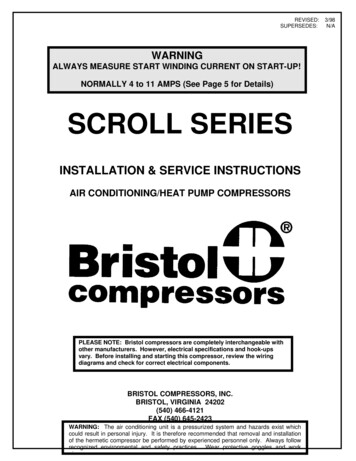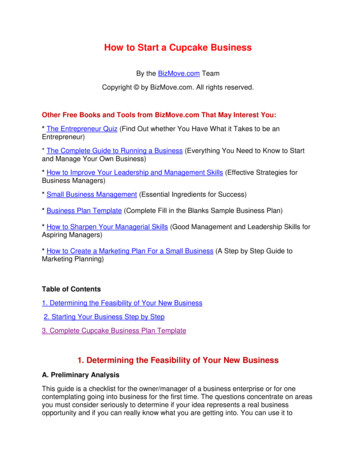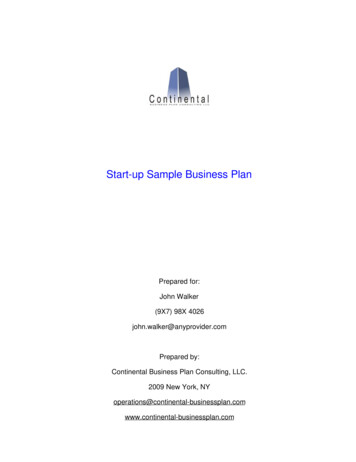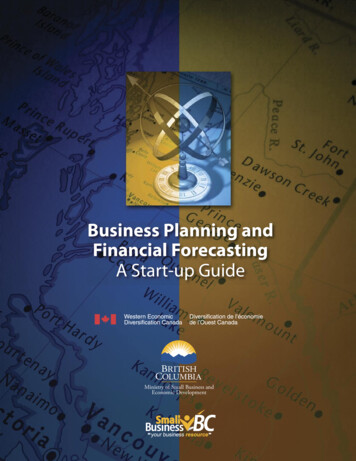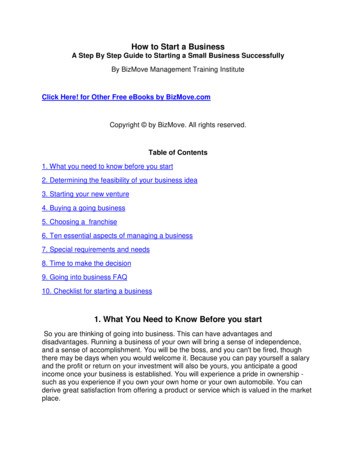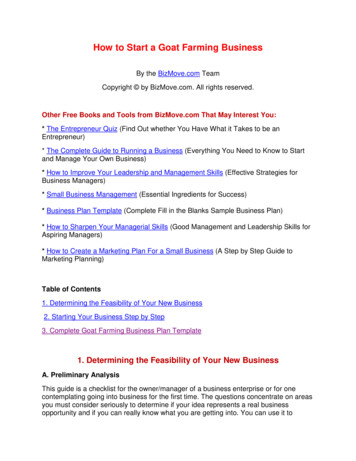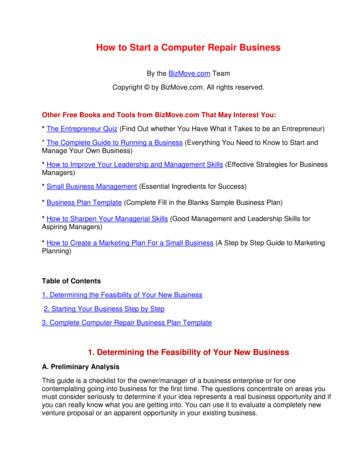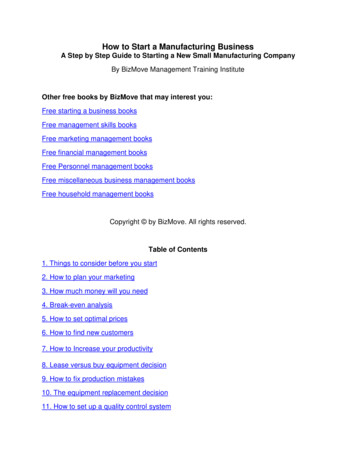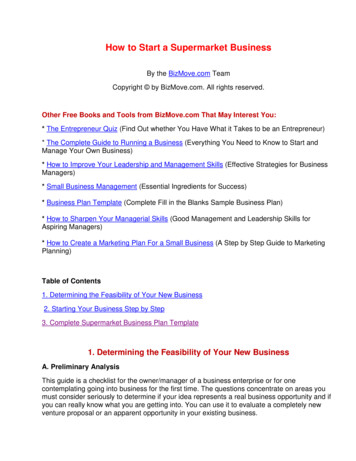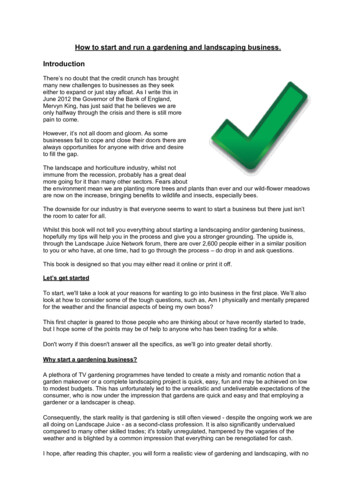
Transcription
BUSINESS START-Up guideStarting a Business in North Carolina
The most updated version of this publication is available atwww.sbtdc.org/pdf/startup.pdfThis guide is authored by the North Carolina Small Business and Technology Development Center(SBTDC), a multi-campus center of The University of North Carolina System. It functions as TheUniversity’s business and technology extension service.LAYOUT, DESIGN and edits done by:Jamie Forbes & Erica GonnermanCommunications Specialists, SBTDCPublished by:The North Carolina Small Business and Technology Development CenterCopyright 2014, All Rights ReservedRevised June 2018This guide is designed to provide useful information and is provided to the reader with theunderstanding that neither the author, editors, nor the publisher is engaged in rendering paid legal,financial, or professional advice in this regard. If such expert assistance is required, the services ofa competent professional should be sought. The information provided does not constitute specificrecommendations to be used for decision-making purposes by the individual reader. Unless otherwiseauthorized in writing by the North Carolina Small Business and Technology Development Center, thispublication shall not be copied, distributed, or duplicated in any format. This publication is for thepersonal use and benefit of an individual or business, and is not intended for commercial sale. In theevent of authorized use, copying or duplication, no fee shall be charged.The Small Business and Technology Development Center (SBTDC) is funded in part through a cooperativeagreement with the U.S. Small Business Administration. All opinions, conclusions or recommendationsexpressed are those of the author(s) and do not necessarily reflect the views of the SBA.BUSINESS start-up guide
BUSINESS START-Up guideStarting a Business in North CarolinaTable of Contents:business start-up planning 7assess yourself as a potential business owner 8personal characteristics 8demands of owning your own business 8business experience and management skills 9self-analysis 9conclusions 11determine concept feasibility 12define your business idea 12redefine the concept 13define your market through research and analysis 14enhancing your chance for success 16examine critical issues & make important decisions 17entry options 17buying an existing business 17buying a franchise 20starting a new business 21BUSINESS start-up guide
selecting and using professionals 22selecting a business location 24minimizing your risks 25worker’s compensation 26legal considerations and requirements27regulatory requirements 27tax information 29protecting intellectual property 32employer responsibilities 33legal structure of your business 34develop your business plan tips for writing a good business plan arrange your business financing 404446getting the funding you need 46equity funding 46debt funding 48how to choose a banker 51what a lender looks for 51tips for getting and using small business credit 53worksheet: uses and sources of funds 56resources and information list 57state resources 57federal resources 58other resources 58licenses, permits and taxes 59internet resource addresses 60index BUSINESS start-up guide 61
INTRODUCTIONScott Daugherty, State DirectorSmall businesses are the lifeblood of our nationaland state economy. The entrepreneurial spiritthat propels people to create and grow newbusinesses has been an essential part of ourgrowth as a state. In fact, small businessesaccount for the majority of net new job creationin North Carolina and nationally.The Small Business and Technology DevelopmentCenter (SBTDC) has long been an organizationcommitted to nurturing this entrepreneurialspirit. This Business Start-Up Guide is one ofthe most highly regarded and valued tools usedby people who are thinking about starting abusiness in North Carolina. The SBTDC alsoprovides valuable counseling assistance toestablished businesses as they grow.The SBTDC is one of the reasons that NorthCarolina is known as a great place to start anddevelop a business. By working closely with ourkey partners, the Community College System’sSmall Business Center Network (SBCN) andthe Department of Commerce’s Business LinkNorth Carolina (BLNC), we will continueto help North Carolina be a leading state forsmall businesses.BUSINESS start-up guide
ABout the SbtdcThe NC Small Business and Technology Development Center (SBTDC) is a business and technologyextension program of the UNC System, administered by NC State University, and operated in partnershipwith the U.S. Small Business Administration.SBTDC specialists assist small and mid-sized businesses throughout North Carolina from 16 offices acrossthe state – each affiliated with a college or university. The SBTDC’s core mission is to help North Carolinabusinesses grow and create new jobs to benefit all North Carolinians. Most SBTDC services are free ofcharge, and all services are confidential. Since 1984, the SBTDC has helped over 135,000 North Carolinaentrepreneurs make their business better.For more information, visit www.sbtdc.org.The SBTDC’s statewide team provides personalized management counseling and education servicesdesigned to help small and midsize businesses: Obtain quality business and market information Evaluate and improve financial performance Access new capital and markets Improve management and employee performance Make better decisions and achieve goalsOur services include not only general business counseling, but also specialized assistance delivered byspecialized programs within the SBTDC.Government Contracting www.sbtdc.org/ptacCounselors educate business owners on how to obtain contracts by providing comprehensive assistance inselling products and services to local, state and federal government agencies.Technology Development & Commercialization www.sbtdc.org/techSpecialized services to small business owners, university researchers and entrepreneurs looking to advance,protect and commercialize their research, innovations and new technology.International Business Development (IBD) www.sbtdc.org/exportOur IBD counselors are highly experienced and certified Global Business Professionals (CGBP) and arehere to assist small and midsize businesses with export planning and exporting.Strategy and Growth Services www.sbtdc.org/strategyFocusing on specialized tools, resources and products to help mid-sized firms and organizations enhanceperformance and accelerate growth through strategic performance retreats and ongoing counseling.6 about the SBTDCBUSINESS start-up guide
business start-up planningCHECKLIST FOR STARTING A BUSINESS Assess yourself as a potentialbusiness ownerpg8Assess yourself as a potential business owner Determine concept feasibility Examine critical issues and makeimportant decisionspg12 Investigate legal considerationsand requirementsDetermine concept feasibility Develop your business plan Arrange your financingRe-evaluater informatAethssssefeasibili tyGafine ideanioDeNourExamine critical issues and make decisionscce & ontactlis tResoYesBUSINESS start-up guidepg17Investigate legal considerationspg26Develop your business planpg39Arrange your business financingpg45business start-up planning 7
ASSess yourself as apotential business ownerWhile owning a business may be a personal dream for many, managing a business may prove difficultbecause of a lack of prior business ownership, experience or management skills. An honest self-evaluationwill allow you to assess your personal characteristics and determine your willingness to meet the demandsof owning your own business.Some of the questions below may be difficult to answer, but it is critical to evaluate your personalweaknesses along with your strengths. When owner weaknesses are identified, partners, managers, staffmembers, other external resources or education and training may be found to balance strengths and offsetweaknesses.Check the questions below that you can answer with “Yes.”Personal characteristics Are you a leader? Are you confident? Do you like to make your own decisions? Do you handle responsibility well? Do you thoroughly plan projects from start to finish? Are you self-disciplined and independent? Are you flexible? Do you read business publications? Do you possess computer skills? Are you aware of your current credit rating? Are you or your spouse willing to dip into your savings if necessary to help support the business? Will your spouse’s income be sufficient to support your family without income from your business?Demands of owning your own business Do you realize that running a business may require long hours and reduced personal income? Do you have the emotional strength and good health to handle the work load and daily schedulethat owning your own business will require? If required, are you prepared to temporarily lower your standard of living until your business isfirmly established? Is your family prepared to support you (time and money required to start a business)?8 assess yourself as a potential business ownerBUSINESS start-up guide
Business experience and management skillsWhat basic skills do you think you will need to succeed in business? Do you possess those skills? If you discover you do not have the basic skills needed for your business, are you willing to delayyour plans until you have acquired the necessary skills? Have you ever worked in a managerial or supervisory position? Have you hired and fired people before? Have you ever worked in a business similar to the one you are considering? Have you had any business training in school? Do you understand business financing and cash flow management? Are you aware of the record keeping requirements expected in managing a small business? Do you understand the fundamentals of marketing and market development?Self-analysisThis self-test is simply an overview of the personal characteristics and basic skills needed in small businessownership. The questions with a “Yes” answer indicate the presence of a strength or attribute needed tosuccessfully manage a small business. Those not checked might indicate weaknesses or a lack of willingnessto make the sacrifices necessary to run a small business.If you decide to continue with plans to establish a business, then you should resolve to change each blank toa “Yes.” A partner or other solution may provide balance for some weak areas, thus changing a few blanksto “Yes.” However, if there are a significant number of unchecked boxes, overcoming problems may requiremore development on your part.Identify the five most important interests, skills, or previous work experience that you enjoyed:1.2.3.4.5.In the space below, write down any opportunities that may be associated with these characteristics, skills,or previous work experience.BUSINESS start-up guideassess yourself as a potential business owner 9
Based on your interest, abilities, and experience, summarize your strengths and weaknesses as they relateto the business skills necessary to start and grow a successful business.Ask someone who knows you well to identify your strengths and weaknesses. Compare your answers.Identified by meIdentified by someone who knows me tify ways you can overcome these weaknesses:What kind of commitment are you willing to make to get your business off the ground?10 assess yourself as a potential business ownerBUSINESS start-up guide
Time commitment:Resources commitment:Are you prepared to lose your investment and other savings? Yes NoWhat are your expectations for the business:Within one year?After three years?ConclusionsUnderstanding your personal characteristics, required business skills, and demands of business ownershipare critical in helping you find the business best suited to you and your interest. Honestly assessing yourselfwill help you determine what you need to do to acquire the skills you need, clarify your expectations, andmotivate you to seek ways to keep learning as you proceed to develop your business idea.BUSINESS start-up guideassess yourself as a potential business owner 11
DETERMINE CONCEPT FEASIBILITYMany questions must be answered and certain information gathered before determining the feasibility ofyour business idea. Careful research and analysis will help you in evaluating your concept and assist you inassessing your idea. This section will cover the following topics: Define your business idea Redefine the concept Define your market through research and analysis Enhancing your chance for successDefine your business ideaThe first step is to begin gathering as much information as possible about your business. You will want toread articles, books, and trade publications. It is also a good idea to visit existing businesses and begin theresearch and planning process.It is important to remember that every business is unique. Taking time to explore your concept will help youidentify those specific factors that make your business concept unique. The following questions will guideyou in defining your business concept. While looking for the answers, also attempt to identify the potentialproblems which might relate to your business idea. What business will you be in? What product or service will you provide to your customers? What problem(s) are you solving for your customer? Who will buy your product or service? Why will your customer buy from you? When will your customer buy your product or service? How will your customer know you have products or services available? How much will your customers pay for your product or service?Using the answers you have provided to the questions above, write a paragraph describing yourbusiness concept.12 determine concept feasibilityBUSINESS start-up guide
Redefine the conceptAs you refine your idea, there are business-specific issues that need to be addressed: What specific product or service will your business provide? Do you have the capability or skills to provide this product or service? If not, how will youovercome this deficiency? What makes your business idea, product or service unique? What will be your competitive advantages? What competitive disadvantages do you have? Have you identified any potential problems? If so, how will you overcome them?In addition to looking at the business concept, you should also explore the market and the industry you areinterested in by seeking out the opportunities and identifying potential problems. Answering the followingquestions will help you assess your market and industry: What industry competition exists in your town or region?Identify your competition: What will you do to better provide a unique or better product or service than yourcompetition? If there is little or no competition, why not? Are there potential international or government procurement opportunities in your productor service? If so, identify them. Are there emerging opportunities in the market place? If so, identify them. Are current business and economic trends favorable? Interest rate Inflation Business climate Business trends UnemploymentRemember, it is important to evaluate all aspects of your business concept and to continually balance yourideas against reality.After defining and refining your business idea, does it still look like a good idea to you? If so, you will nowwant to do more in-depth market research and analysis to better define your market and opportunity.BUSINESS start-up guidedetermine concept feasibility 13
Define your market through research and analysisWhile market research provides data and information about the industry and its customers, market analysishelps the business owner understand the business environment and the basis on which s/he must compete.Market researchMarket research tells you who your customers are, where they are, and how large the potential marketis. Through research, you will be able to gather certain information and data such as: Demographics Identify customers’ needs Size of your potential market Customer lifestyles and buying behavior Specifically who the customer is Determine demand for your product or serviceThere are two basic types of market research—primary and secondary:Primary research is research gathered firsthandthrough techniques like surveys, questionnaires,focus groups, or in-depth interviews. Primaryresearch can be time consuming and possiblyexpensive.However, it provides the business owner with theopportunity to hear customer feedback and actaccordingly.Primary research methodsSecondary research is already publishedresearch. It includes sources like directories,industry journals, and association publications.Secondary research is accessible, less expensive,can be conducted on a continuous basis, andcan be combined with the business owner’sknowledge of the business, geographicalconditions, and customer base. The businessowner can informally tailor the research findingsto meet the needs of the business. Surveys In-depth interviews Competitor analysis Business directories Questionnaires Industry reports Focus groups Newspapers Tracking customer response toadvertising and promotion Business magazines Website and social media metrics Trade publications Market analysisSecondary research sources(Available at many libraries)Quantify the information gathered whenever possible.14 determine concept feasibilityBUSINESS start-up guide
Market analysisA market analysis is a comprehensive review of the business climate where the company will compete.It includes a thorough analysis of the industry, customer demographics and buying patterns, competitors,and the general business and economic climate, including a review of regulations and barriers to entry.This analysis will help the business owner identify SWOTS (strengths, weaknesses, opportunities, andthreats) and determine whether the business or industry provides an attractive opportunity.The Four P’s of Marketing should be considered when conducting your company’s market analysis. PRODUCT What is the product or service you intend to provide? Are there other similarofferings? Does your product or service provide a better value to the buyer? Is it newer, faster,cleaner, cheaper? Maybe you have exclusivity or own the intellectual property. How big is theindustry? How much do you think you can command? PLACE How will your product or service be distributed? Catalog? Website? Dedicatedsalesforce or storefront? Is that easier, faster, or cheaper than similar offerings? Are there anylimitations to where or how your product can be distributed (i.e, is your product regulated ordoes it require licensing?) Do you have exclusivity? Do you own the distribution channel (thesales force, truck line, store front, etc.)? Is your distribution better or worse than the rest ofthe industry? PRICE Is your price higher or lower than the competition? Why? Is it better or worse thancompetitive offerings? Maybe you have proprietary rights. If it is in demand, you can likelycharge a higher price. Is it a generic item? Are there taxes, licenses, or fees that impact theprice? How much do you have to charge to recoup your costs and make a profit? PROMOTION Knowing what you do about the industry, your competitors and customers,how will you promote the product? Will you use social media, a sales force, mass media (TVand radio), word of mouth, referrals, or discounting to promote your product? What will thatcost and how can that best reach the users you have identified?A thorough examination of the 4P’s will not only help you define your market and prospective buyer, itwill assist you in identifying target markets and developing a successful go-to-market strategy.Research the following: THE INDUSTRY How many other organizations are already offering your product or service?What is their total volume? Is it increasing or declining? How many similar or substituteproducts and services are available? Are there barriers to entry or issues with obtaining rawmaterials? What about legal issues, lawsuits, recalls, etc. Is this an old product or the latestthing? COMPETITORS How many direct competitors will you have? Identify their strengths andweaknesses and develop a plan for confronting them in the marketplace. BUSINESS CLIMATE Research general market conditions and demand for the products andservices within your chosen market area and industry.How to find informationYou can obtain information about your industry and general business conditions using easily assessableresources from the NC Library System. Most of the larger public libraries, and all of the UNC academiclibraries, have a business librarian that can help you find appropriate secondary research sources.BUSINESS start-up guidedetermine concept feasibility 15
Online market research resources (the basics)DEMOGRAPHICSInformation about the population and groups within it, including age, income, race, poverty, education: US Census Bureau American Fact Finder – index.xhtml US Census Bureau Quick Facts – T045216 Simply Analytics— access through SBTDC, NC LIVE, or your local business librarianPSYCHOGRAPHICSInformation about people including attributes, buying patterns, interests, and other psychological criteria: Simply Analytics — access through SBTDC, NC LIVE, or your local business librarian NC LIVE, an online research source available to anyone holding an NC public or academiclibrary card. Bureau of Labor Statistics Survey of Wage Data by Area and Occupation — https://www.bls.gov/bls/blswage.htm US Census Bureau Industry Statistics Portal — https://www.census.gov/econ/isp/ First Research — access through SBTDC, NC LIVE, or your local business librarian IBIS World — access through your NC SBTDC office, NC LIVE or your local business librarian Snapshot Series Industry Reports (Proquest Business Market Research Collection) — accessthrough SBTDC MRS, NC LIVE, or your local business librarianCOMPANY INFORMATION Reference USA — access through SBTDC MRS, NC LIVE, or your local business librarian D & B Business Browser (formerly OneSource) — access through SBTDC, NC LIVE, or yourlocal business librarian Hoover’s Company Records (Proquest Business Market Research Collection) — access throughSBTDC MRS, NC LIVE, or your local business librarianEnhancing your chance for successThere are always risks associated with starting a new business. But, you will be able to minimize thoserisks by compiling and studying information about the industry and your marketplace. Plan ahead. Contact people who can help locate the information you need to put your planin place. Seek professional advice from an SBTDC counselor, accountant, attorney, or others. Make sure you have experience in management and in the type of business you want to start. Try to use your strengths and interests in the most appropriate way. Make decisions based on facts or reliable information. Don’t make hasty decisions in lieu ofgood information. Seek the support of your family during the start-up phase and difficult times. Talk to others in the same business. Join trade associations and attend meetings andconferences. Be persistent, and DON’T GIVE UP!16 determine concept feasibilityBUSINESS start-up guide
EXAMINE CRITICAL ISSUES ANDMAKE IMPORTANT DECISIONSAs you explore starting your own business, you will find there are many decisions which must be made andimportant issues to consider in order to minimize your risk and increase your success.Four important topics covered in this section are: Entry options Selecting and using professionals Selecting a business location Minimizing your risksEntry optionsYou may be considering starting your own business as a result of a life situation triggering yourentrepreneurial desires. Such events could include corporate down-sizing, an accident that limits yourphysical abilities, or receipt of an inheritance. There are many reasons why people want to go into businessfor themselves, and there are various options for entering a business of your own. The most common entryoptions are: Buying an existing business Buying a franchise Starting a new businessBuying an existing businessPurchasing an established business can lighten the burden of start-up costs, lag time without a salary,establishing markets, and other costs associated with the creation of a new business. Establishedbusinesses may have existing good will – intangible (non-monetary) assets such as reputation orhistorical value.The decision to buy a business requires careful evaluation of many factors, including pricing and financingyour purchase.The potential buyer must understand the criteria for selecting a business as well as the motivation forwanting to purchase the business.Consideration should be given to the following: What is your experience with the industry and/or management? Does the business match your strengths? Is the business what you enjoy doing? Is it in a desirable location? What are you willing to invest? Can you get financing?BUSINESS start-uP GUIDEexamine critical issues and make important decisions 17
What size business do you desire in terms of sales, profit, and employees? Is the business fairly priced? Is it profitable?If the business under consideration has a product or service outside your area of expertise, it isimportant to make certain that the key employees will stay after the sale or that you can hire someonewith similar experience.Finding a business for saleFinding a good business opportunity is not always easy. Sources to consider: Printed advertisements Trade sources and suppliers in the industry Friends and acquaintances Intermediaries such as business brokers, real estate brokers or acquisition specialistsEvaluating the businessAs a buyer, first evaluate a business by reviewing its history and the way it operates. Develop anunderstanding of the business’ method of acquiring and serving its customers, determine how itgenerates its sales, learn its marketing strategy, and develop an understanding of its finance andoperations functions.Checklist of material for the evaluation process*Obtain the following information from the existing business: 3-5 years financial statements 3-5 years tax returns Interim financial statements Copies of all real estate, leases, or deeds Debt schedule Accounts receivable and aging schedule Accounts payable and aging schedule Inventory list Supplier list (including contracts) Customer list (including contracts) Projections Organizational charts and employee contracts Industry information to which the owners may have access Details of equipment leases and other contingent financial commitments*CHECKLIST PROVIDED BY THE SABRE GROUP—CONFIDENTIAL BUSINESS SALES ANDVALUATIONS OF GREENSBORO/RALEIGH/DURHAM/GREENVILLE18 examine critical issues and make important decisionsBUSINESS start-up guide
Important questionsEvaluate the business’ potential according to your goals, employer responsibilities, product or servicedemand, market, and financial considerations.Ask and get answers to questions regarding all aspects of an existing business before entering anypurchase agreements. Start with basic questions, like those listed below. Others may be requireddepending on the specific business: Why is the business for sale? Has it been making a profit? If not, do you have a plan to make thebusiness profitable? What kind of reputation does the establishment have currently? How would you change thatreputation? What is the price of good will? What is the consistency of the client base – a fewlarge clients or many smaller customers? Will the sale include equipment, property, inventory, debts, employee contracts, name, logo,slogans, signage, customer files, etc.? Are all of the books in order and well maintained? Have you reviewed the past and current financial statements with the counsel of an accountant? Are there any liens against the property for sale? Are there any claims on inventory orequipment? Have the taxes been paid to date? Have you reviewed existing business contracts and the effect of the transaction on thosecontracts? Are customers loyal because of a personal relationship or because of the level of quality service? Will the lease be transferred into your name or will the owner require a new lease? Is thelocation suitable for your plans? Are there any environmental concerns with this location? Arethere licensing concerns? What liabilities exist? What policies have been established with the employees regarding work environment, salary/commissions, benefits, vacation pay, and fringe benefits? Will the owner be cooperative with the transition of ownership with regard to tax issues, utilitytransfers, government requirements, employees, and other procedures? Are there any environmental issues with respect to your chosen business? If using a broker, do you realize they are representing the interest of the seller? Is the seller willing to sign a non-compete agreement? Will the seller agree to a contractual arrangement for a period of consultation? Consider whether owner is willing to finance all or some of the purchase priceThe services of an accountant, attorney, and banker are recommended when buying an existing business.Investigation and research will be crucial to uncovering as much information as possible about thebusiness for sale.BUSINESS start-uP GUIDEexamine critical issues and make important decisions 19
Buying a franchiseFranchising has emerged as a popular way for potential business owners to start a new business. Afranchise offers advantages in name and product recognition, proven operation procedures as well asvolume purchasing power. In this arrangement, the provider, or franchisor, contracts with you, thefranchisee, to give you the right to sell or dis
BUSINESS start-up & Resource guide Table of Contents: business start-up planning 7 assess yourself as a potential business owner 8 personal characteristics 8 demands of owning your own business 8 business experience and management skills 9 self-analysis 9 conclusions 11 determine concept feasibility 12 define your
